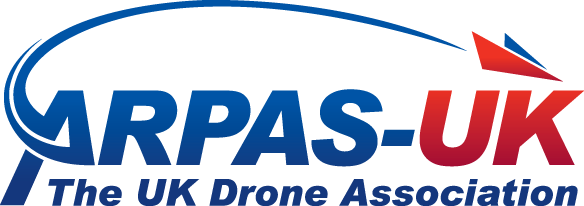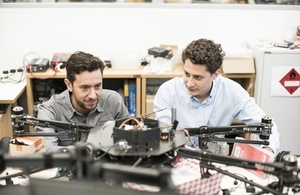Government announces the first wave of winners receiving government funding for ground-breaking aviation projects solving major global challenges

- Projects include using drones and aviation technologies to solve major global challenges, including coronavirus pandemic and climate change, while creating new jobs across the UK
- 20 winning ideas are the first wave of projects to be announced from a wider £33.5 million pot for 48 projects
- funding is part of efforts to build back better from COVID-19 and support innovative new enterprises
Innovative projects harnessing the latest technology to support the fight against COVID-19 and other challenges like climate change, while creating hundreds of jobs across the country, have been backed by government investment, Business Minister Nadhim Zahawi has announced today (9 November 2020).
The 20 winning ideas will receive a share of £7 million funding ranging from the development of drones capable of delivering COVID-19 medical supplies to remote areas, to technology to enable remote inspections of infrastructure and construction sites – removing the need for workers to potentially be put at risk.
The funding, backing the aviation technologies of the future, comes at a critical time for the industry, with winners demonstrating pioneering ways they are responding and adapting to the challenges posed by issues including climate change and the coronavirus pandemic.
The funding today forms part of a wider £33.5 million investment with an additional 28 potential projects also in the pipeline for government backing.
Business and Industry Minister, Nadhim Zahawi, said:
As the UK leads the way in the aviation revolution, these bold proposals showcase the pioneering spirit of the UK’s aerospace and aviation industries in solving global issues, and those facing us here in the UK.
Today we have announced over £7 million of funding for projects across the country which demonstrate how using the latest and most cutting-edge aviation technologies can step up our response to the coronavirus pandemic, help us build back better and cement our well-earned reputation for research and development excellence, while creating hundreds of new jobs.
Transport Minister Rachel Maclean said:
The UK is already a world-leader when it comes to innovation in aviation and this funding will allow us to carry on supporting the extraordinary work taking place right across the country.
Innovation delivers real change and our support for dynamic ideas in this exciting sector means we are now seeing real life solutions, like the drone delivery of COVID-19 medical supplies, for challenges such as public health and climate change.
The £33.5 million investment comes from the Future Flight Challenge, which aims to increase mobility, reduce reliance on road travel thereby improving road congestion, and increase UK manufacturing opportunities. Today the first wave of 20 winners have been announced, with more projects to be announced in the coming weeks.
Of these, 9 projects are focussed on developing technology to aid the response to the coronavirus pandemic. This includes the development of unmanned drones to deliver medication, reducing human contact and, consequently, transmission of the virus.
Advances in alternative, green energy sources to power aircraft, including hydrogen and electricity, are also a key feature of some of the winning proposals.
The projects include:
- Dock-to-Dock, based in Cardiff, which is developing a pilot project to deliver goods between Bristol and Cardiff using a hydrogen-powered electric aircraft.
- NAPKIN, based in Greater London, which focuses on paving the way for low and zero carbon short-haul flights for passengers around the UK.
- APIAN Limited, based in Essex, is creating and building a drone to deliver medical supplies like COVID-19 blood and swab tests between NHS hospitals and labs in response to the pandemic, protecting key NHS staff and the wider public from coronavirus transmission.
- The Light Aircraft Company Ltd, based in Norfolk, will integrate electric propulsion into existing aircraft to enable electric flight of small aircraft.
- Windracers Distributed Avionics, based in Southampton and Bristol, will develop swarming technology, an approach to coordinate multiple robots, to allow multiple drones to fly in close formations and work together to provide humanitarian aid or fight fires.
- Droneprep Ltd, Consortiq Limited and Windracers Limited, based in Cornwall and the Isles of Scilly, will use unmanned aerial vehicles to deliver critical PPE and Covid-19 testing kits to vulnerable, rural communities in Cornwall and the Isles of Scilly.
Today’s announcement is part of wider support for the aviation and aerospace industries. The UK has a world-leading aerospace sector generating well-paid jobs and suitable growth across the country, and the government is continuing to support the industry – and their aviation customers – with over £9.5 billion in R&D grants, loans and guarantees, and support for exports and exporters.
Notes to editors:
In total 34 projects are set to receive a share of £30 million, while an additional 14 projects, focused specifically on coronavirus response, will receive a share of a further £3.5 million.
Today 20 winners, receiving a total of £7.35 million, have been announced.
Of the winning proposals announced today, projects include:
- Windracers SWARM technology (Southampton, Bristol): This project will develop technology which allows multiple drones to fly in close formations for a variety of purposes including fighting fires and providing humanitarian aid.
- Dock-to-Dock (Cardiff): Dock-to-Dock will demonstrate an alternative to road transportation between coastal cities, developing a pilot project to deliver goods by air using clean energy: initially between Avonmouth Docks in Bristol and Cardiff Docks in Wales. The project will focus on vehicle performance and the infrastructure necessary for hydrogen-powered electric aircraft which take-off and land vertically, and therefore don’t require runways.
- NAPKIN (Greater London): By looking at different aspects of air travel – including aircraft, airports, airspace, airlines, passengers and communities – NAPKIN will help accelerate the introduction of sustainable, low and zero carbon commercial flights. This includes project partners Cranfield Aerospace, GKN and Rolls-Royce, who are developing conceptual designs for electric aircraft, while airport partners are using their expertise to assess the viability of plans for sustainable flights.
- Drone Defence (Nottinghamshire): Drone Defence Services and the University of Nottingham will develop sensor technology to track aircraft. By monitoring all aircraft, Drone Defence aims to provide increased airspace awareness which will prevent drone misuse and enable drones to safely share the sky with other aircraft.
- Gold Dragon (Llanbedr, Wales): This project will develop sensor technology for unmanned drones, prioritising health and emergency services including the Police, Coastguard, and Mountain Rescue. It is linked closely with skills development and STEM engagement activities with Gwynedd Council and the Welsh Government. In addition, a recent Economic Impact Assessment estimated that successful development at the Snowdonia Aerospace Centre could contribute 515 jobs to the local area.
Projects focused specifically on coronavirus include:
- Cornish Drone Airbridge (Cornwall/Isles of Scilly): Using drones, this project will develop technology capable of delivering PPE and COVID-19 testing kits to vulnerable rural communities in Cornwall and the Isles of Scilly.
- MediDrone (London): MediDrone’s project will develop a network of small drones following paths between medical facilities, acting as high-speed shuttles for small medical packages. This will improve the delivery speed of critical medication, and limit human contact with supplies to reduce the risk of transmitting COVID-19 to vulnerable patients.
- BVLOS Drone Comms for COVID-19 (Hertford): This project will help improve contact between drones and their control rooms when flying outside the operator’s line of sight. The creation of such technology would help realise the use of drones to deliver medical supplies to patients and collect medical samples.
- Remote industrial inspection by drone (Chichester): As the pandemic has meant many have had to spend time off work due to illness or work from home, this project aims to enable remote inspection and monitoring of industrial sites by drone. By reducing workers’ exposure to the virus, this will help increase worker productivity and safety, thereby reducing project cost and risk.
This investment is part of the government’s commitment to help advance the UK’s future transport system through its extensive R&D Roadmap and to increase R&D public spending to £22 billion per year by 2024/25.
The £7.35 million funding announced today represents the first wave of projects totalling £33.5 million funding through the Future Flight Challenge (FFC). Over the next few years, The FFC will distribute £125 million from the Industrial Strategy Challenge Fund (ISCF). The FFC aims to accelerate the UK’s position as a world leader in revolutionising how people, goods and services fly. It focuses on the development and demonstration of a novel integrated aviation system that enables the safe operation of new classes of air vehicles. These include air taxis, drones and regional aircraft using electric or autonomous technologies. The Industrial Strategy Challenge Fund aims to bring together researchers and businesses to tackle the big societal and industrial challenges of today.
Further quotes:
Future Flight Challenge Director at UK Research and Innovation, Gary Cutts, said:
At this very challenging time for the international aviation industry, it is a great testament to the UK’s drive and ambition that we have had such a strong response to the first funded Future Flight competition.
The breadth, quality and creativity of the bids has been exceptional and the economic and social benefits offered are very significant.
Chair of the Drone Industry Action Group, Ian Gray, said:
The Future Flight Challenge has been hugely successful in bringing together the different communities necessary to realise the economic and social benefits in the UK of autonomous air vehicles. I am delighted on behalf of the Drones Industry Action Group to see the range of successful grant awards including drone developers, service providers and Air Traffic Management solution providers.
The Drone Industry Action Group was established in 2016 as a collaborative forum for government.
Published 9 November 2020
From:Department for Business, Energy & Industrial Strategy, UK Research and Innovation, and Nadhim Zahawi MP





